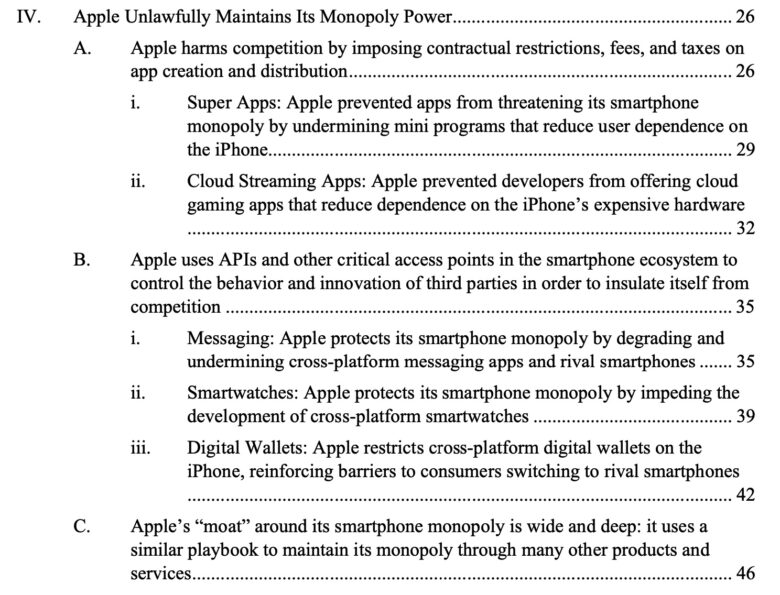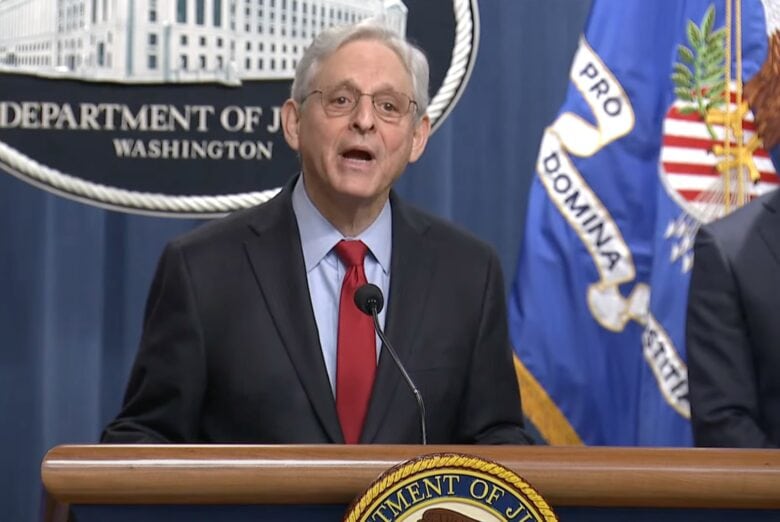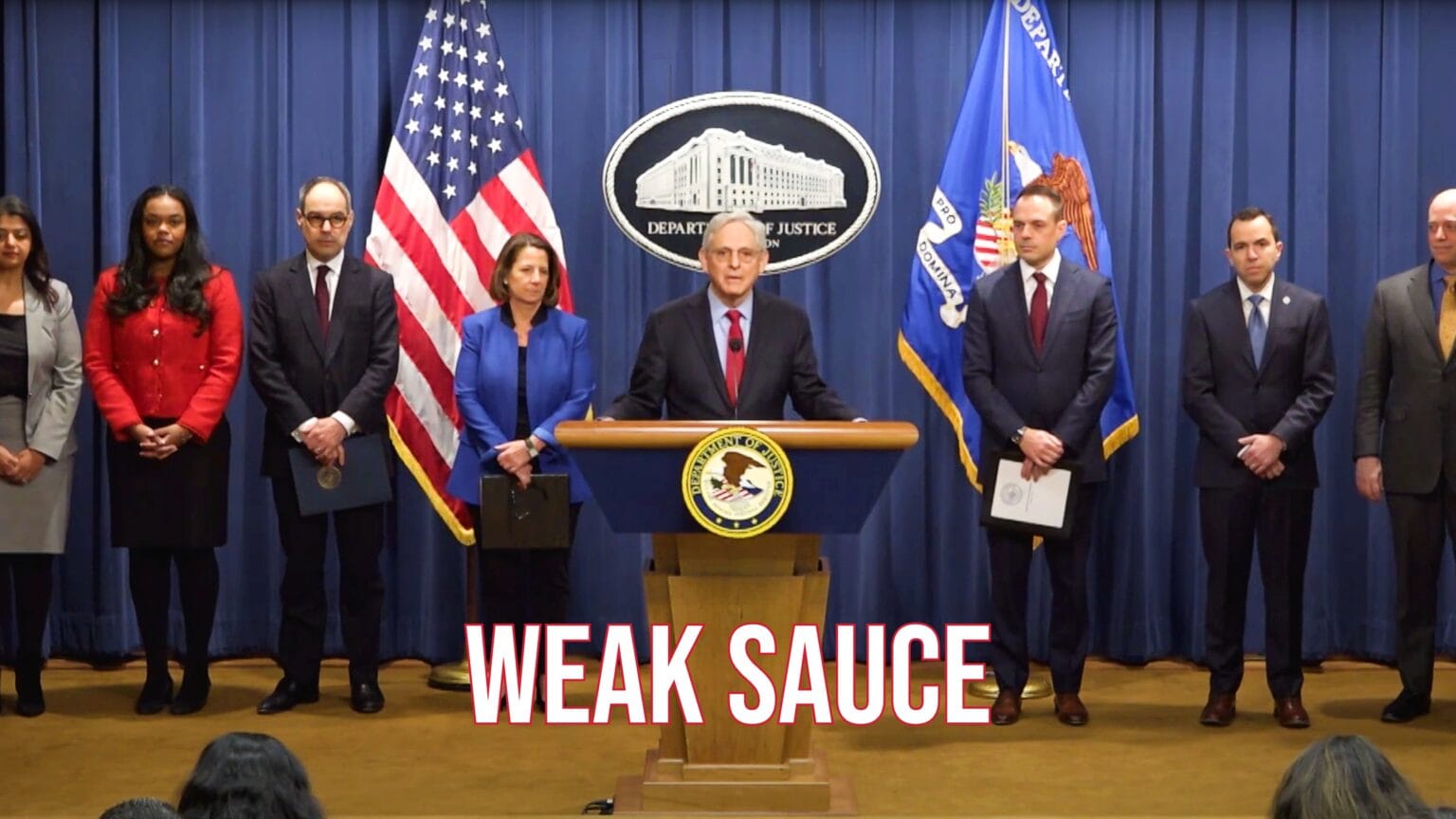The Department of Justice’s monumental Apple antitrust case appears weak.
Still, the civil lawsuit, filed Thursday, represents the biggest legal challenge to Apple’s power in the company’s 47-year history. If successful, the lawsuit could force Apple to fundamentally change the way it makes products and conducts business. A similar action against Microsoft in the 1990s significantly curtailed that company’s reach and power.
But the DOJ’s lawsuit against Apple appears to be based on old and outdated information, and Apple has already — or is about to — address most of the major concerns.
Why the Apple antitrust case is weak

Photo: Department of Justice
In the United States, most antitrust lawsuits stem from the 1890 Sherman Antitrust Act, enacted in the Gilded Age, when railroad robber barons and predatory oil and electricity giants dominated the American economy. Since then, antitrust lawsuits have remade entire industries, as with the breakup of the Bell telephone monopoly in the early 1980s.
In the tech sector, giants like Google, Microsoft, Amazon, Facebook and Intel have all been targeted for antitrust action, often resulting in big changes to how they do business. Most famously, Microsoft had its wings clipped after the DOJ sued the company for abusing its monopoly power in operating systems to stifle the emerging market for web browsers. The company suffered a couple of decades of diminished power until recently recovering its mojo under CEO Satya Nadella.
Apple mostly skirted antitrust action until recently, as its growing power and dominance of the smartphone sector attracted attention from regulators. In recent years, Apple has faced lawsuits from lawmakers in Europe, Korea and now the United States.
The DOJ’s case against Apple hinges on five major areas where Apple is accused of blocking competition:
- Messaging apps.
- Digital wallets.
- Cloud streaming apps.
- So-called “super apps.”
- Smartwatches.
The DOJ alleges that Apple illegally stifles competition in these areas, allowing it to maintain an illegal smartphone monopoly that harms consumers.
The department launched its investigation in 2019 under the Trump administration, as Apple grew into one of the biggest companies in the world. A big antitrust lawsuit against Apple has been anticipated for years.
In anticipation, Apple already took steps to address three out of five of the main issues in the DOJ’s lawsuit. And the two remaining — smartwatches and super apps — remain contentious.
Messaging apps
The DOJ accuses Apple of harming consumers by “undermining” messaging apps, either with iMessage’s infamous green bubbles on Android or by delivering degraded audio and video in third-party messaging apps.
“Apple makes third-party messaging apps on the iPhone worse generally and relative to Apple Messages, Apple’s own messaging app, by prohibiting third-party apps from sending or receiving carrier-based messages,” the lawsuit alleges. “By doing so, Apple is knowingly and deliberately degrading quality, privacy, and security for its users and others who do not have iPhones.”
This paragraph refers to Android users in group messaging chats getting scaled-down images and video. But this is a limitation of SMS and MMS, which makes it a carrier problem, not Apple’s. (Apple’s Messages app uses those protocols instead of iMessage when sending messages to non-Apple devices.)
In addition, there’s no shortage of competition among messaging apps. There are dozens of third-party messaging apps available on iPhone, from FaceBook messages to WhatsApp, the most popular messaging service in the world. These apps can be freely installed without restriction, and have access to key iPhone features like notifications.
With regard to Apple’s own messaging service, Messages, it’s true that Apple uses green bubbles for messages from non Apple-devices, a source of shame and embarrassment for some users. However, Apple already committed to adding the Rich Communications Services, the messaging protocol used on Android devices, to its Messages app in the next big update of iOS 18, due later this year.
It’s not clear whether Apple’s support for RCS will kill off the notorious green bubbles. But the company’s support of RCS is clearly spurred by regulatory scrutiny, so Apple will likely address it in some way. Plus, adding RCS should improve images and videos sent between iPhone and Android devices, making the DOJ’s accusations moot.
Digital wallets
The DOJ’s antitrust case also accuses Apple of limiting third-party digital wallets’ access to the iPhone’s near-field NFC chip, which cripples third-party tap-to-pay services.
It’s true that when Apple launched contactless payments in 2014 with iOS 8.1, the feature was initially restricted to Apple’s own Wallet app. Apple allowed other financial institutions to offer contactless payments, but only through its app.
However, two years ago, in June 2022, Apple opened up the iPhone’s NFC with Tap to Pay. The feature is being used by several financial companies, including PayPal, Chase Bank, Square, Stripe and Mastercard.
It’s unclear why the DOJ would accuse Apple of abusing this feature when the company opened it up two years ago.

Photo: Department of Justice
Cloud streaming apps for gaming
The same holds true for cloud streaming apps. The DOJ accuses Apple of stifling the gaming market by forbidding cloud streaming game apps, which allegedly harms consumers by forcing them to buy expensive gaming hardware instead of streaming games to their iPhones.
“Cloud streaming games … can improve smartphone competition by decreasing the importance of expensive hardware for accomplishing high compute tasks on a smartphone,” the lawsuit says. “Suppressing cloud streaming games harms users by denying them the ability to play high-compute games, and it harms developers by preventing them from selling such games to users.”
Apple initially forbade game streaming services in the App Store. But in 2020, as game streaming services like Xbox Cloud Gaming, Facebook Gaming and GeForce Now took off, Apple relaxed its App Store rules to allow them. Apple simply insisted that developers submit games individually, rather than as a hub that could stream multiple titles.
But Apple changed even that policy earlier this year — again, likely because of regulatory scrutiny — to allow game streaming services to run through a single app “with the capability to stream all of the games offered in their catalog.”
Again, the DOJ’s complaint stems from previously restrictive practices that Apple has since loosened up.
Smartwatches
The DOJ also alleges Apple limits the functionality of third-party smartwatches on iPhone. That makes Apple Watch more attractive to iPhone owners. And once they buy an Apple Watch, they become less likely to switch away from Apple’s platform.
“Apple uses smartwatches, a costly accessory, to prevent iPhone customers from choosing other phones,” the suit alleges. “Apple’s smartwatch — Apple Watch — is only compatible with the iPhone. So, if Apple can steer a user towards buying an Apple Watch, it becomes more costly for that user to purchase a different kind of smartphone because doing so requires the user to abandon their costly Apple Watch and purchase a new, Android-compatible smartwatch.”
The DOJ is right that Apple Watch requires an iPhone. Apple Watch is basically an iPhone accessory. You need an iPhone to set up your Apple Watch and use it. Anybody who buys an iPhone knows this, or quickly finds out.
If you willingly buy an accessory for any other item, like a lawnmower or car, must you be able to use it with a competing brand? Plus, the DoJ’s argument that Apple Watch users would switch to Android if they were compatible is dubious at best.
Cross-platform ‘super apps’
The DOJ alleges that Apple limits so-called super apps, which are all-encompassing apps (like China’s WeChat) that offer multiple services in a single app, like calls, messaging, payments, shopping and social media.
The DOJ argues that super apps are good for consumers because users get everything they want under one roof. Plus, they’re good for developers, who don’t need to create separate apps for iOS or Android. Everything runs inside a cross-platform super app.
This is a threat to Apple, the DOJ says, because super apps lower switching costs. The DOJ cites an Apple boardroom presentation where super apps were described as a threat.
“Apple recognizes that super apps with mini programs would threaten its monopoly,” the suit says. “As one Apple manager put it, allowing super apps to become ‘the main gateway where people play games, book a car, make payments, etc.’ would ‘let the barbarians in at the gate.’”
But once again, Apple is relaxing its rules about super apps. In January, Apple said it would start allowing mini-apps and games in super apps, although it will impose some restrictions, such as not allowing mini-apps to use Apple’s in-app purchase system.
DOJ’s weak antitrust lawsuit targets Apple’s past behavior
Apple already appears to be obviating many of the DOJ’s complaints by relaxing rules regarding contactless payments, streaming game services and super apps. Some of these changes, like RCS, have yet to be implemented, but Apple appears to be trying to head off the DOJ at the pass.
Whether Apple’s concessions will satisfy the DOJ remains to be seen — and likely will be litigated in court, possibly for years to come. But on the face of it, the DOJ’s lawsuit seems weak because it’s based on Apple’s past behavior, not the current reality.


